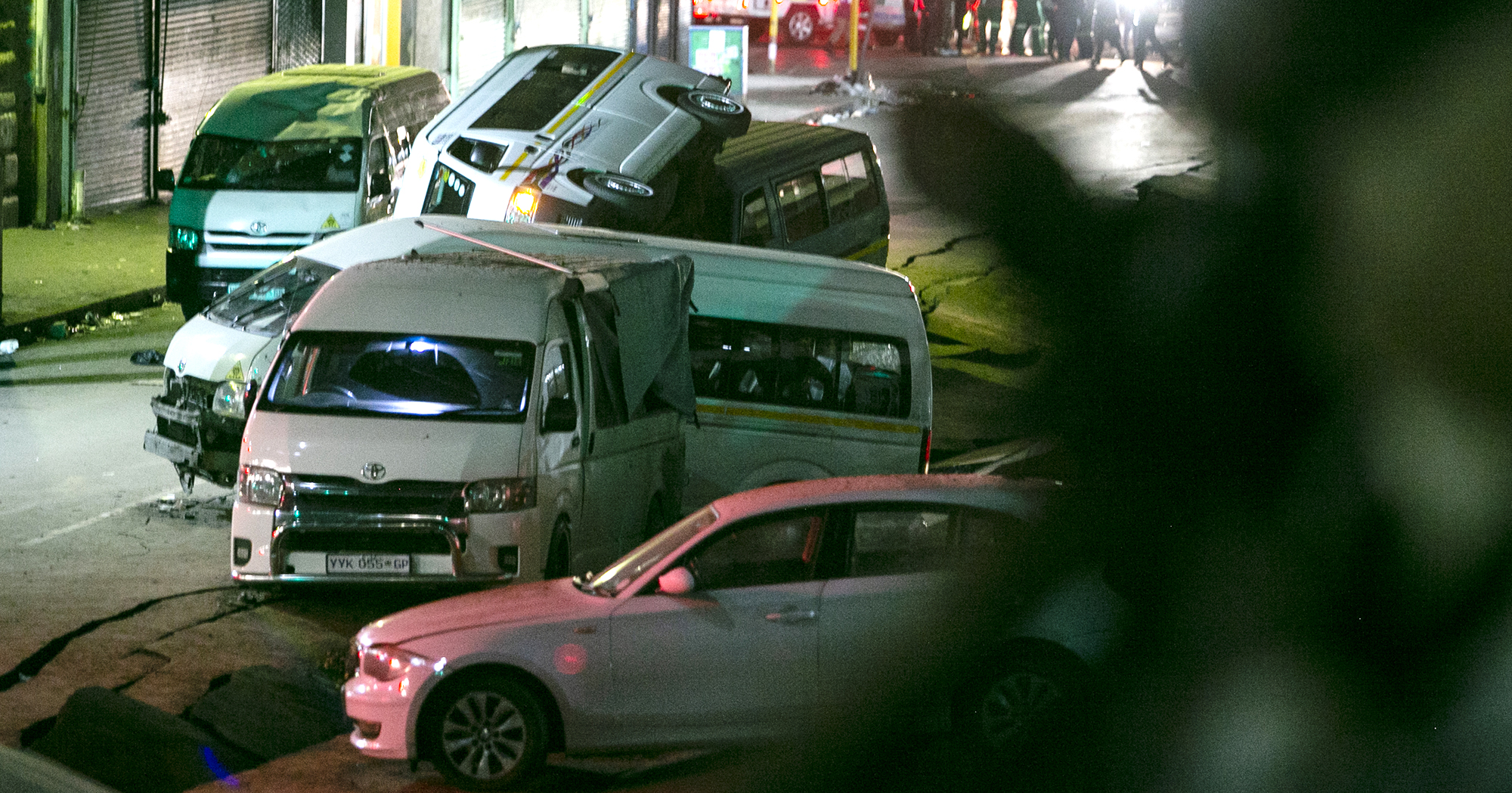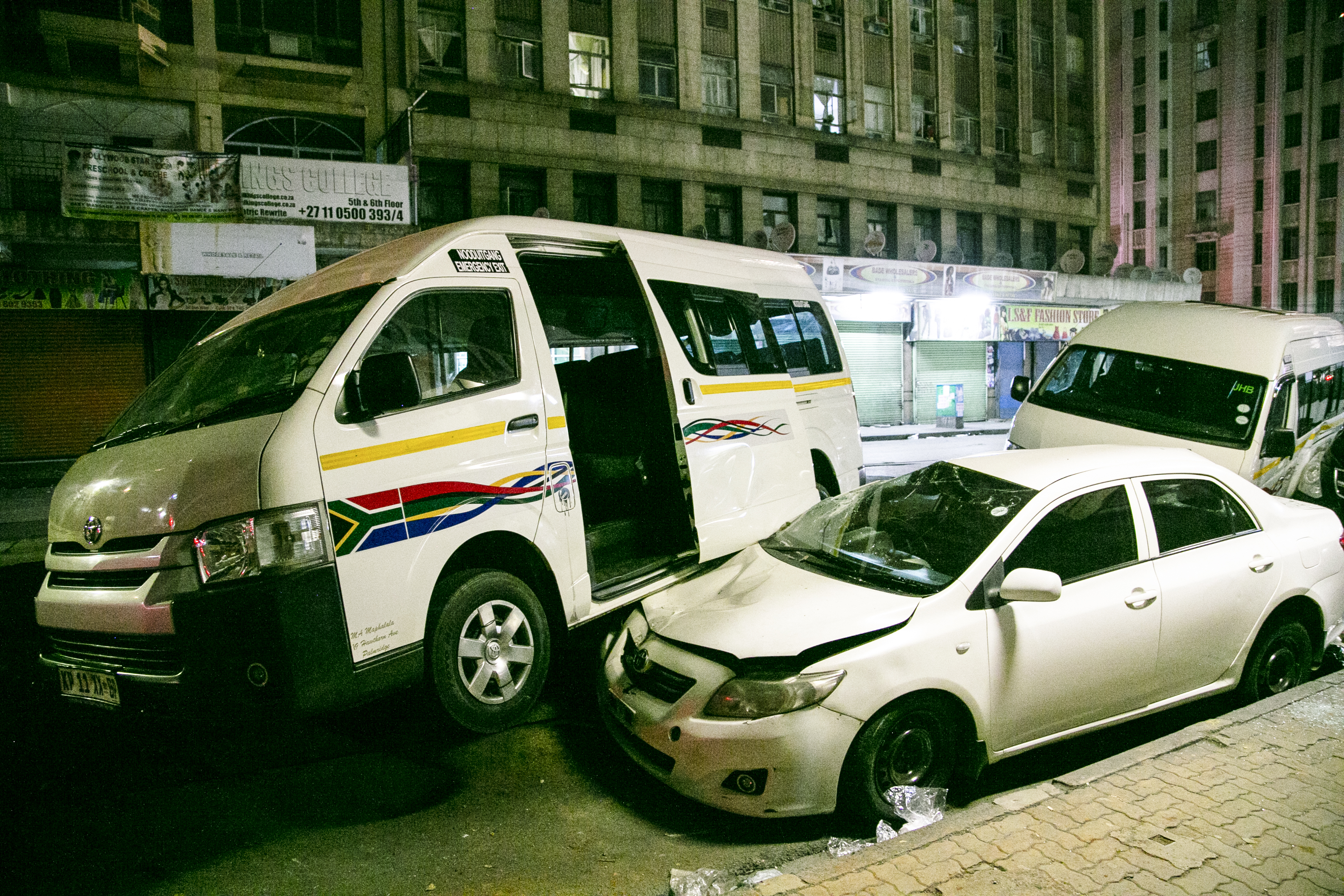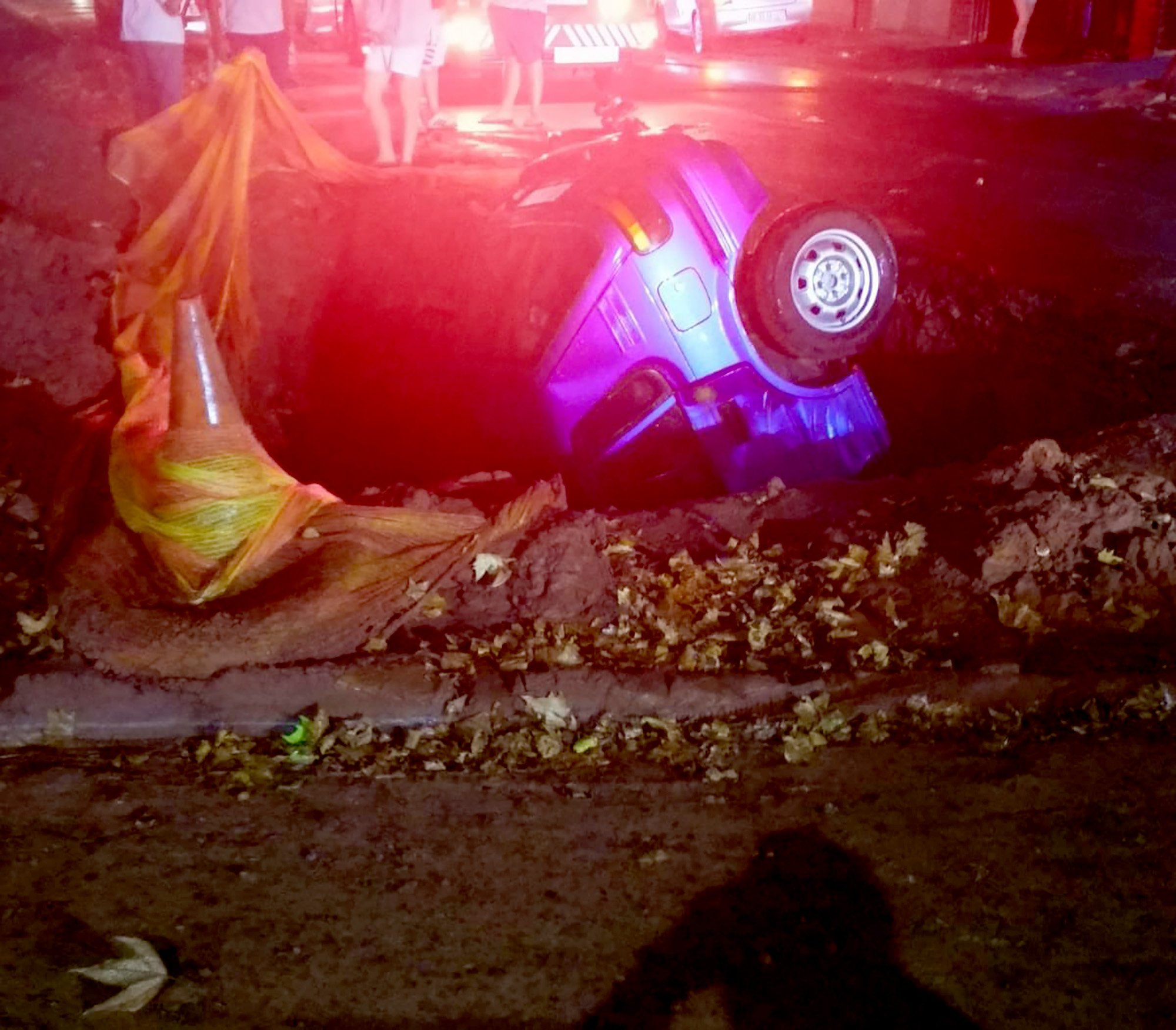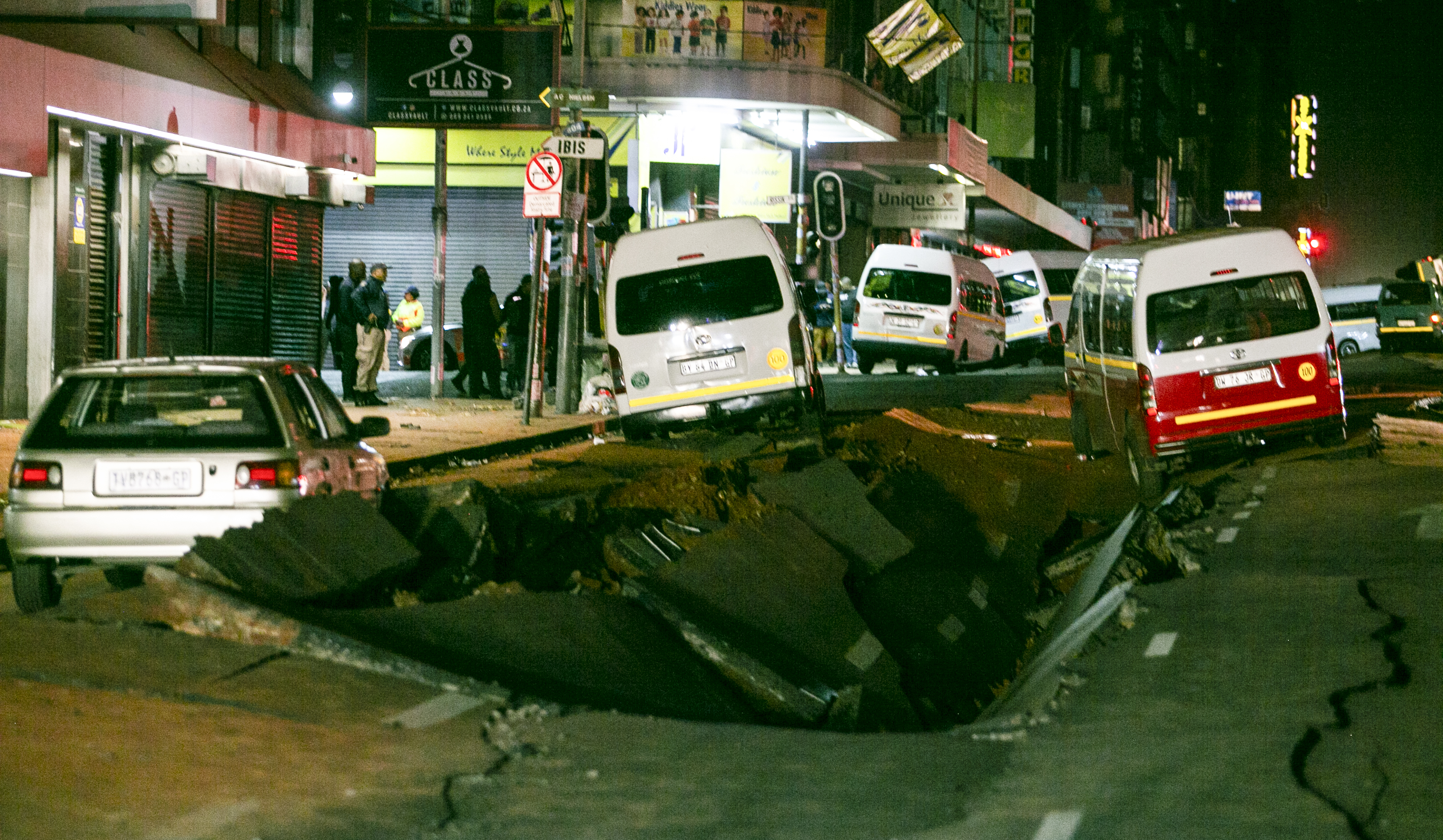I do not know what caused the explosion that ripped Johannesburg’s Lillian Ngoyi Street apart last week. At the time of writing the authorities did not know either.
The most watched video of the explosion showed a man who was nearly crushed by a minibus taxi that was tossed into the air and nearly fell on him. Enock Michael, from Malawi, was trying to eke out a living like millions of other people in South Africa. Another Malawian street vendor, Joseph Dumisane, was not so lucky. He was crushed to death by a taxi.
Executive Mayor of Johannesburg Kabelo Gwamanda showed up at the scene, but he was hardly noticeable, especially with limelight predator Panyaza Lesufi also there. Even if Lesufi wasn’t there, Gwamanda has neither the confidence nor sagacity for the job of leading any city, let alone Johannesburg.
While the explosion made international news, it was also one more incident in a gradual collapse that has been years in the making, and progressing almost daily. For the six years to the end of 2021, I worked in the Johannesburg CBD. Going there every day is an extreme sport.
In 2018, one of my then employer’s security guards was shot dead in cold blood next to the main entrance in the early afternoon. I watched him die. He was a kid, born in the 1990s and supposedly “born free”. On that day we had journalists from several African countries in the building, and they came out to board their hired bus just as he was taking his last breath. They were understandably shaken.
Failed governance
There is also the abnormal situation of car insurance companies directing traffic at intersections where traffic lights are almost permanently defective, or fixing potholes, lauded by some as some kind of corporate patriotism. It is not. Normal, functioning cities elsewhere do not need insurance companies to fix potholes and direct traffic.
In any event, homeless people direct Johannesburg traffic these days. Some have dirty, torn reflective jackets, but most wing it. Motorists patiently oblige them because they have accepted that their government is absent from the most basic of its functions.
 Several people were injured following an explosion that rocked Johannesburg on Wednesday, 19 July, 2023. (Photo: Felix Dlangamandla)
Several people were injured following an explosion that rocked Johannesburg on Wednesday, 19 July, 2023. (Photo: Felix Dlangamandla)
Lately, even some of Johannesburg’s premier suburbs like Bryanston sometimes go for days without water. There is always some kind of unplanned excavation going on, usually to fix a burst water pipe. I am continuously amazed by how accustomed residents of these dysfunctional but expensive suburbs have become to their situation.
Earlier this year, I visited the home of a businessman, an ANC supporter, in one of Johannesburg’s leafy suburbs. His house is truly impressive, but the street outside his home is not. It is pockmarked with potholes and suffocating from uncut alien plants. He told me he is stuck with the house because he can only sell it for far less than it’s worth, while the value of his Cape Town home has appreciated significantly.
Explosions, water cuts, power cuts, malfunctioning traffic lights manned by homeless people and crime are not the only things besetting Johannesburg, Tshwane, Ekurhuleni, Mangaung or Buffalo City, among others. There is also filth, which lately characterises previously grand boulevards of South African cities.
In Paarl last year, a community activist told us that the local Mbekweni Police Station does not usually record violent crimes. The cops there encourage residents to report the crime at another police station so that it is at least on the system and cannot be “disappeared” by one of the many corrupt cops there. They are on the payroll of a local gangster, who also determines who can and cannot run for town council.
Mbekweni has an informal settlement that defies imagination. It is situated on a riverbed and constantly damp, even outside the rainy season. Illegal electrical connections crisscross the “streets”, posing a permanent danger to children and adults alike. It must be a death trap at this rainy time of the year.
Political collapse
This is just a snapshot of the South Africa in which we live. I get a lot of people who ask “so what is your solution?” when I comment on many of the problems we have. The insinuation is that these problems exist because we have not yet found the perfect technical solution that will make these problems go away.
Technical solutions are really important, but the simple truth is that politics is by far the biggest obstacle to the wellbeing of millions of South Africans. There is no technical solution for a city that cannot keep the same mayor for longer than one year, and when one is there, he is clearly not up to the task.
There is no technical or policy solution to lawlessness where criminal gangs have captured first the politicians and then the police. The right solution is political change, as with it comes new ideas and political will to do the very simple things that are no longer possible.
South Africa is physically falling apart virtually before our eyes, and its starkness is only matched by the paralysis of its elites to do anything about it at all.
Roads, buildings, bridges, and water pipes, among other things, are collapsing. Walking or driving up a street like Russell Road in Gqeberha, or Oxford Street in East London, especially on a Saturday afternoon when there are few cars on the road, lays bare the extreme neglect that causes it all.
There is no magic solution to fixing infrastructure. Solid leadership, proper planning and resource allocation are irreplaceable as the foundations of getting things right. It is about building and maintaining solid public institutions that attract talented people to apply their technical skills for public benefit.
 An explosion left destruction in its wake tearing up Bree Street in the Central Business District of Johannesburg, South Africa on 19 July 2023. (Photo: Felix Dlangamandla)
An explosion left destruction in its wake tearing up Bree Street in the Central Business District of Johannesburg, South Africa on 19 July 2023. (Photo: Felix Dlangamandla)
Countries do not collapse and descend into chaos at once. It takes many years, with thousands of daily signs that things are falling apart. In that time, people with the power to prevent that collapse believe “others”, meaning the poor, need the change more. This is even as their wealth, savings and ability to survive without a job are eroded daily.
It is literally possible to tally up the financial and opportunity cost. Over a six-month period, historical and current looting of Eskom cost Shoprite at least R560-million in diesel consumption it should have never needed. Kumba Iron Ore has deferred R2-billion of capital investments because of Transnet’s problems, and load shedding. In the quarter to June this year, Pick n Pay spent R300-million on diesel, putting it on track to spend R1.2-billion over a 12-month period.
Whenever I speak to groups of middle- and upper-class South Africans, many of whom want the change but without investing much or any effort, I am told, “Take your message to the poor people, the villages and townships. You must go there”.
Three requirements for change
Real change will only happen when three things occur at once.
The first is for the middle- and upper-income classes to substitute quiet and social media outrage with political organising so they may have real political power to use. It is not the job of poor South Africans to create change that must, by rights, be inherited by those who do not take the initiative to realise their political hopes and convictions.
Second, as fractured as it is politically, organised business must realise that the cost of political dysfunction will escalate. They all need to mark the price at which it becomes unsustainable and then ask themselves whether the quiet acquiescence was worth the erosion of value. Will it be when it costs a Shoprite or Pick n Pay R4-billion per year each to pay for infrastructure shortages their taxes are supposed to have paid for already? Will it be a riot against either of them when they are forced to retrench poor workers?
 A sinkhole on Long Street in Albertville, Johannesburg which had not been fixed despite desperate pleas from residents for months on end. 8 March 2022. (Photo: Twitter / @SajedaMansoor)
A sinkhole on Long Street in Albertville, Johannesburg which had not been fixed despite desperate pleas from residents for months on end. 8 March 2022. (Photo: Twitter / @SajedaMansoor)
Finally, there is no possibility for change if the tens of millions of South Africans who have lost faith in the political system do not return to the ballot. In a democracy, only democratic participation drives sustainable change, otherwise the substitute is violence.
Political organising for change through democratic action, or support thereof, are the only ways South Africa will get out of the hole that inaction is digging. However, I am not always so hopeful. The conditions under which millions of people live are simply intolerable, and their patience to suffer through the dysfunction and corruption will not last as long as the elite’s tolerance for erosion of their wealth and comfort.
Our collective duty is to create a moment in which people in different income strata appreciate the commonality of their interests in this time of crisis. Next year’s elections present the very last opportunity for those who want change to move beyond words and into action, and fight for the future their children deserve.
In this respect, silence or mere words are not enough. People need to help at least 10 other people to register and encourage them to vote next year. They also need to pick a political cause. Sitting on the fence has become immoral and complicit. DM
Songezo Zibi is the National Leader of RISE Mzansi.




 A sinkhole on Long Street in Albertville, Johannesburg which had not been fixed despite desperate please from residents for months on end. 8 March 2022. (Photo: Twitter / @SajedaMansoor)
A sinkhole on Long Street in Albertville, Johannesburg which had not been fixed despite desperate please from residents for months on end. 8 March 2022. (Photo: Twitter / @SajedaMansoor) 